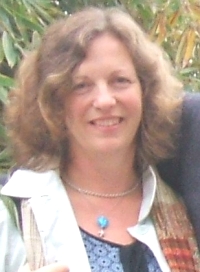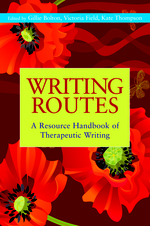 By Victoria Field, co-editor with Gillie Bolton and Kate Thompson of the new book Writing Routes: A Resource Handbook of Therapeutic Writing.
By Victoria Field, co-editor with Gillie Bolton and Kate Thompson of the new book Writing Routes: A Resource Handbook of Therapeutic Writing.
When I attended my first-ever writing workshop in 1995 at the relatively mature age of 32, I was astonished how easily the words flowed, as if a dam had been breached. I couldn’t stop writing and was only slowed down by the rate at which I could push my pen across a page or pound the keys on an old electric typewriter. I was writing fiction but all of it was based on real experiences. At the time, I was aware I was accessing emotions and memories that had been long buried, and how cathartic that process was.
I spent hours letting the stories seemingly write themselves. I re-lived painful memories of my father’s dying and found myself writing about traumatic events experienced by those close to me as well as by myself. It was an exhilerating sensation that opened the door for me into the world of ‘therapeutic writing’ and set me on the path to eventually qualifying as a Poetry Therapist ten years later.
Fifteen years since that first workshop, I still have the writing impulse and know that life goes better when I regularly process my preoccupations and turn ideas and impressions into writing, whether fiction, poetry, drama or straight memoir. It’s also gratifying to see that the evidence base for the health benefits of writing is growing all the time, particularly through the work of American researcher, James Pennebaker.
But I am no longer naive about the process. I have a sense of what might be coming and where my writing might be leading me. This means that, like a sailor subtly leaning on the tiller, I can change course if need be, avoid the storms and head for safer waters. It also means that sometimes I need to nudge myself into setting sail at all. Now that I engage in more formal writing, I tend to have an eye on the finished product and a sense of who its audience might be. Therapeutic writing is all about trusting the process and not, at least at the beginning, being overly concerned about the product. I sometimes need to give myself permission to dive back into the exciting, unpredictable waters of just writing whatever comes. And it’s helpful to have an element of surprise that comes, as it did on my first writing workshop, from following the prompts of other people.
 Permission to write is one of the threads running through our new book, Writing Routes. Each of the 70 or so contributors has described their own way in to therapeutic writing. Each of them tells a personal story of how they were prompted to write, what they wrote and what they learned from it. These stories are told in such a way that readers can easily emulate the process and see what emerges for themselves.
Permission to write is one of the threads running through our new book, Writing Routes. Each of the 70 or so contributors has described their own way in to therapeutic writing. Each of them tells a personal story of how they were prompted to write, what they wrote and what they learned from it. These stories are told in such a way that readers can easily emulate the process and see what emerges for themselves.
One of the characteristics of therapeutic writing and the world of poetry therapy, is its inclusiveness and willingness to share techniques and their outcomes. In the pages of Writing Routes, the words of eminent poets such as Gwyneth Lewis, Les Murray and Penelope Shuttle sit alongside those of writers in print for the first time. All of us are first-timers when we sit down with the blank page in front of us.
Writing Routes also confirms and extends the community of people interested in the potential of words to heal. There’s a paradox that whilst writing is usually a solitary activity, there are many benefits of writing in groups: gentle pressure from the facilitator, unexpected suggestions and the heightened state that comes from being with others can all lead to strange synchronicities that energise the writing and encourage people to greater self-awareness and creativity. It’s not always possible to write in a group, but a book like Writing Routes, can, through its first-person accounts, mimic a sense of writing as a conversation.
One morning this Christmas, I was delighted to see a kingfisher from my mother’s kitchen window. It made me think of a contribution to our book from Abi Curtis, in which she describes how she created a poem based on a memory of seeing a kingfisher. Her piece is followed by one by Kate Compston turning conventional wisdom on its head and describing how a poem might invite us to write it. After reading these two accounts, I start noting associations with the bird I’ve just seen. The kingfisher’s astonishing blue and the time of year puts me in mind of Nativity scenes and the fact that my mother is called Mary. Suddenly, I have a way into my writing, bringing together images of domesticity and wonder, personal material about my mum and the healing qualities of nature. Kate and Abi’s pieces are in the chapter called ‘Getting Into Writing’. Other chapters in the book are organised by subject matter, so if readers know that they want, or need, to write about family or transitions or physical ailments, they can easily find ideas and suggestions for getting started.
Our title reflects the way writing is a journey – or rather many journeys. Many of the contributions in Writing Routes describe how personal writing also provides maps for the future, enabling the writer to see the way ahead more clearly. The closing piece in the book, by Fiona Hamilton, appropriately, describes writing on trains. She notes that ‘writing offered no saccharine alleviation of symptoms but rather a passionate making and remaking, a taking pleasure, delight, an experiencing of loss, hopelessness, hope, a reaching out, a shedding, a perpetual enquiry.’
I’m writing this blog entry at the beginning of the new year and offer you Fiona’s comment as a writing prompt: What have you lost in 2010? What are your hopes for 2011? What are you shedding? Where will you find pleasure and delight?
Your pen is inviting you to pick it up and write and through your writing, trite as it may sound, take steps to heal your past, live your present and create your future.
Victoria Field is a Certified Poetry Therapist and writes poetry, short fiction, drama and memoir. She is a regular tutor at Ty Newydd, the National Writing Centre for Wales.
Writing Routes is part of JKP’s Writing for Therapy or Personal Development series, Edited by Gillie Bolton.
Copyright © Jessica Kingsley Publishers 2011.
What I was taught to call “journalling” has helped me enormously over the last twenty years and I have suggested it to friends and students as a way to clarify their feelings about trauma and loss. It has allowed me to write freely and laid the ghost of an English teacher who told me I was no good at writing. One student shared his poetry and writing with me and exhibited almost Shakespearian word play and intricacy of conceits and emblems.
I would recommend it to anyone. I just wish I could make a living doing it and free up more time for writing.
I’d love to be able to take part in this kind of therapy, but suffer from pretty constant blocking. Any tips/pointers to resources on unblocking in a therapeutic writing context?